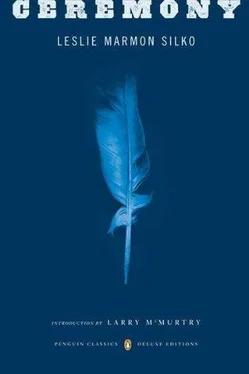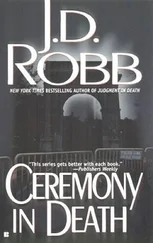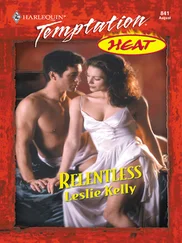But after they started school, the edges of the distance softened, and Auntie seldom had the boys to herself any more. They were gone most of the day, and old Grandma was totally blind by then and always there, sitting close to her stove. Rocky was more anxious than Tayo to stay away from the house, to stay after school for sports or to play with friends. It was Rocky who withdrew from her, although only she and Tayo realized it. He did it naturally, like a rabbit leaping away from a shadow suddenly above him.
Tayo and Auntie understood each other very well. Years later Tayo wondered if anyone, even old Grandma or Josiah, ever understood her as well as he did. He learned to listen to the undertones of her voice. Robert and Josiah evaded her; they were deaf to those undertones. In her blindness and old age, old Grandma stubbornly ignored her and heard only what she wanted to hear. Rocky had his own way, with his after-school sports and his girl friends. Only Tayo could hear it, like fingernails scratching against bare rock, her terror at being trapped in one of the oldest ways.
An old sensitivity had descended in her, surviving thousands of years from the oldest times, when the people shared a single clan name and they told each other who they were; they recounted the actions and words each of their clan had taken, and would take; from before they were born and long after they died, the people shared the same consciousness. The people had known, with the simple certainty of the world they saw, how everything should be.
But the fifth world had become entangled with European names: the names of the rivers, the hills, the names of the animals and plants — all of creation suddenly had two names: an Indian name and a white name. Christianity separated the people from themselves; it tried to crush the single clan name, encouraging each person to stand alone, because Jesus Christ would save only the individual soul; Jesus Christ was not like the Mother who loved and cared for them as her children, as her family.
The sensitivity remained: the ability to feel what the others were feeling in the belly and chest; words were not necessary, but the messages the people felt were confused now. When Little Sister had started drinking wine and riding in cars with white men and Mexicans, the people could not define their feeling about her. The Catholic priest shook his finger at the drunkenness and lust, but the people felt something deeper: they were losing her, they were losing part of themselves. The older sister had to act; she had to act for the people, to get this young girl back.
It might have been possible if the girl had not been ashamed of herself. Shamed by what they taught her in school about the deplorable ways of the Indian people; holy missionary white people who wanted only good for the Indians, white people who dedicated their lives to helping the Indians, these people urged her to break away from her home. She was excited to see that despite the fact she was an Indian, the white men smiled at her from their cars as she walked from the bus stop in Albuquerque back to the Indian School. She smiled and waved; she looked at her own reflection in windows of houses she passed; her dress, her lipstick, her hair — it was all done perfectly, the way the home-ec teacher taught them, exactly like the white girls.
But after she had been with them, she could feel the truth in their fists and in their greedy feeble love-making; but it was a truth which she had no English words for. She hated the people at home when white people talked about their peculiarities; but she always hated herself more because she still thought about them, because she knew their pain at what she was doing with her life. The feelings of shame, at her own people and at the white people, grew inside her, side by side like monstrous twins that would have to be left in the hills to die. The people wanted her back. Her older sister must bring her back. For the people, it was that simple, and when they failed, the humiliation fell on all of them; what happened to the girl did not happen to her alone, it happened to all of them.
They focused the anger on the girl and her family, knowing from many years of this conflict that the anger could not be contained by a single person or family, but that it must leak out and soak into the ground under the entire village.
So Auntie had tried desperately to reconcile the family with the people; the old instinct had always been to gather the feelings and opinions that were scattered through the village, to gather them like willow twigs and tie them into a single prayer bundle that would bring peace to all of them. But now the feelings were twisted, tangled roots, and all the names for the source of this growth were buried under English words, out of reach. And there would be no peace and the people would have no rest until the entanglement had been unwound to the source.
He could anticipate her mood by watching her face. She had a special look she gave him when she wanted to talk to him alone. He never forgot the strange excitement he felt when she looked at him that way, and called him aside.
“Nobody will ever tell you this,” she said, “but you must hear it so you will understand why things are this way.” She was referring to the distance she kept between him and herself. “Your uncle and grandma don’t know this story. I couldn’t tell them because it would hurt them so much.” She swallowed hard to clear the pain from her throat, and his own throat hurt too, because without him there would have not been so much shame and disgrace for the family.
“Poor old Grandma. It would hurt her so much if she ever heard this story.” She looked at Tayo and picked a thread off the bottom of her apron. Her mouth was small and tight when she talked to him alone. He sat on a gunny sack full of the corn that Robert and Josiah had dried last year, and when he shifted his weight even slightly, he could hear the hard kernels move. The room was always cool, even in the summertime, and it smelled like the dried apples in flour sacks hanging above them from the rafters. That day he could smell the pale, almost blue clay the old women used for plastering the walls.
“One morning,” she said, “before you were born, I got up to go outside, right before sunrise. I knew she had been out all night because I never heard her come in. Anyway, I thought I would walk down toward the river. I just had a feeling, you know. I stood on that sandrock, above the big curve in the river, and there she was, coming down the trail on the other side.” She looked at him closely. “I’m only telling you this because she was your mother, and you have to understand.” She cleared her throat. “Right as the sun came up, she walked under that big cottonwood tree, and I could see her clearly: she had no clothes on. Nothing. She was completely naked except for her high-heel shoes. She dropped her purse under that tree. Later on some kids found it there and brought it back. It was empty except for a lipstick.” Tayo swallowed and took a breath.
“Auntie,” he said softly, “what did she look like before I was born?”
She reached behind the pantry curtains and began to rearrange the jars of peaches and apricots on the shelves, and he knew she was finished talking to him. He closed the storeroom door behind him and went to the back room and sat on the bed. He sat for a long time and thought about his mother. There had been a picture of her once, and he had carried the tin frame to bed with him at night, and whispered to it. But one evening, when he carried it with him, there were visitors in the kitchen, and she grabbed it away from him. He cried for it and Josiah came to comfort him; he asked Tayo why he was crying, but just as he was ashamed to tell Josiah about the understanding between him and Auntie, he also could not tell him about the picture; he loved Josiah too much to admit the shame. So he held onto Josiah tightly, and pressed his face into the flannel shirt and smelled woodsmoke and sheep’s wool and sweat. He even forgot about the picture except sometimes when he tried to remember how she looked. Then he wished Auntie would give it back to him to keep on top of Josiah’s dresser. But he could never bring himself to ask her. That day in the storeroom, when he asked how his mother had looked before he was born, was the closest he’d ever come to mentioning the picture.
Читать дальше












